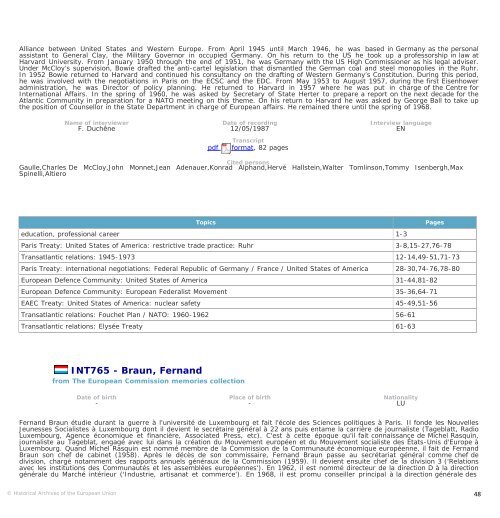EUArchives - Interviews - European University Institute
EUArchives - Interviews - European University Institute
EUArchives - Interviews - European University Institute
Create successful ePaper yourself
Turn your PDF publications into a flip-book with our unique Google optimized e-Paper software.
Alliance between United States and Western Europe. From April 1945 until March 1946, he was based in Germany as the personal<br />
assistant to General Clay, the Military Governor in occupied Germany. On his return to the US he took up a professorship in law at<br />
Harvard <strong>University</strong>. From January 1950 through the end of 1951, he was Germany with the US High Commissioner as his legal adviser.<br />
Under McCloy’s supervision, Bowie drafted the anti-cartel legislation that dismantled the German coal and steel monopolies in the Ruhr.<br />
In 1952 Bowie returned to Harvard and continued his consultancy on the drafting of Western Germany’s Constitution. During this period,<br />
he was involved with the negotiations in Paris on the ECSC and the EDC. From May 1953 to August 1957, during the first Eisenhower<br />
administration, he was Director of policy planning. He returned to Harvard in 1957 where he was put in charge of the Centre for<br />
International Affairs. In the spring of 1960, he was asked by Secretary of State Herter to prepare a report on the next decade for the<br />
Atlantic Community in preparation for a NATO meeting on this theme. On his return to Harvard he was asked by George Ball to take up<br />
the position of Counsellor in the State Department in charge of <strong>European</strong> affairs. He remained there until the spring of 1968.<br />
Name of interviewer<br />
F. Duchêne<br />
Date of recording<br />
12/05/1987<br />
Transcript<br />
pdf format, 82 pages<br />
Interview language<br />
EN<br />
Cited persons<br />
Gaulle,Charles De McCloy,John Monnet,Jean Adenauer,Konrad Alphand,Hervé Hallstein,Walter Tomlinson,Tommy Isenbergh,Max<br />
Spinelli,Altiero<br />
Topics Pages<br />
education, professional career 1-3<br />
Paris Treaty: United States of America: restrictive trade practice: Ruhr 3-8,15-27,76-78<br />
Transatlantic relations: 1945-1973 12-14,49-51,71-73<br />
Paris Treaty: international negotiations: Federal Republic of Germany / France / United States of America 28-30,74-76,78-80<br />
<strong>European</strong> Defence Community: United States of America 31-44,81-82<br />
<strong>European</strong> Defence Community: <strong>European</strong> Federalist Movement 35-36,64-71<br />
EAEC Treaty: United States of America: nuclear safety 45-49,51-56<br />
Transatlantic relations: Fouchet Plan / NATO: 1960-1962 56-61<br />
Transatlantic relations: Elysée Treaty 61-63<br />
INT765 - Braun, Fernand<br />
from The <strong>European</strong> Commission memories collection<br />
Date of birth<br />
-<br />
Place of birth<br />
-<br />
Nationality<br />
LU<br />
Fernand Braun étudie durant la guerre à l'université de Luxembourg et fait l'école des Sciences politiques à Paris. Il fonde les Nouvelles<br />
Jeunesses Socialistes à Luxembourg dont il devient le secrétaire général à 22 ans puis entame la carrière de journaliste (Tageblatt, Radio<br />
Luxembourg, Agence économique et financière, Associated Press, etc). C'est à cette époque qu'il fait connaissance de Michel Rasquin,<br />
journaliste au Tageblat, engagé avec lui dans la création du Mouvement européen et du Mouvement socialiste des États-Unis d'Europe à<br />
Luxembourg. Quand Michel Rasquin est nommé membre de la Commission de la Communauté économique européenne, il fait de Fernand<br />
Braun son chef de cabinet (1958). Après le décès de son commissaire, Fernand Braun passe au secrétariat général comme chef de<br />
division, chargé notamment des rapports annuels généraux de la Commission (1959). Il devient ensuite chef de la division 3 ('Relations<br />
avec les institutions des Communautés et les assemblées européennes'). En 1962, il est nommé directeur de la direction D à la direction<br />
générale du Marché intérieur ('Industrie, artisanat et commerce'). En 1968, il est promu conseiller principal à la direction générale des<br />
© Historical Archives of the <strong>European</strong> Union 48

















